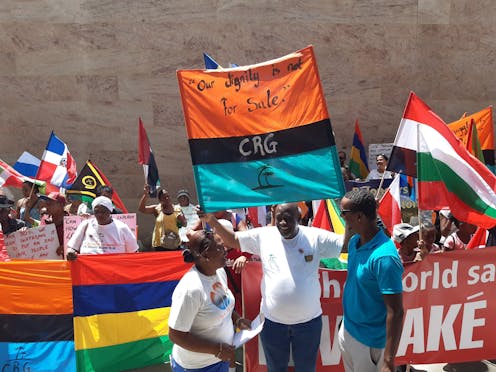
Britain is on the cusp of decolonising Mauritius – again. The first attempt at decolonisation took place in 1968 but went unfulfilled when London kept hold of an island group that had long been regarded as Mauritian territory: the Chagos Archipelago.
In recent years, the international community has handed down a clear and consistent view that Britain’s occupation of the Chagos Islands is illegal. Now, London and Port Louis are engaged in talks over the future of the islands – the final act, perhaps, in the decolonisation of Mauritius.
Britain’s foreign secretary, James Cleverly, has suggested that an agreement on the status of the Chagos Archipelago will come “by early next year”.
But what might a settlement look like?
The answer depends almost entirely on what can be agreed about the future of Diego Garcia, the largest island of the Chagos group. It’s the site of a critical US military base that Britain has dutifully hosted for the past 50 years.
The American elephant
It is hard to overstate the legal and political pressure that Britain faces to withdraw from the Chagos Islands. No fewer than 116 national governments, the UN General Assembly, the African Union and the International Court of Justice have called upon Britain to cease its occupation of the islands. The settled opinion of the international community is that Diego Garcia and the rest of the Chagos Archipelago belong to Mauritius, not the United Kingdom. This is not much of a grey area.
But complying with international law is a voluntary act.
For a long time, Britain’s policy was that the Chagos Islands would be returned to Mauritius when they were no longer needed “for defence purposes”. In his written statement to announce talks with Port Louis, Cleverly appeared to reaffirm this commitment by insisting that “any agreement between our two countries will ensure the continued effective operation” of the base on Diego Garcia.
The elephant in the room is that Britain does not now need – and, in fact, has never truly depended upon – the Chagos Archipelago for military purposes. Only a handful of British military personnel cycle through Diego Garcia. What, then, is London waiting for?
In reality, it is US forces that use the island of Diego Garcia as a logistics hub and staging post for military actions across the Indo-Pacific. As they negotiate with Mauritius, British leaders are therefore mostly interested in securing guarantees that America’s military interests will not be harmed by a transfer of authority to Port Louis.
This is what will shape negotiations over the territory’s future.
Difficult talks ahead
Four scenarios stand out as realistic.
First, Britain could relinquish its claim to the Chagos Archipelago without delay, and with few or no strings attached. This would be the “cleanest” way to uphold London’s obligations to Mauritius under international law. It would then be up to Port Louis and Washington to decide upon the future of the base on Diego Garcia.
Second, London could suggest a staged approach to decolonisation. The opening phase would see Britain return the so-called “Outer” Chagos Islands to Mauritius – that is, the 57 islands of the archipelago that have never been used for military purposes, which are scattered around 100 miles north and west of Diego Garcia. But in exchange, Port Louis would grant London temporary sovereignty over Diego Garcia (a rump British Indian Ocean Territory) so that the base there could continue its operations uninterrupted for a specified amount of time.
Another variant of this option would be for Britain to acknowledge Mauritian sovereignty over the entire Chagos Archipelago – including Diego Garcia – but negotiate to access rights for itself and the United States.
Finally, talks could break down altogether. This is a real possibility. Decision-makers in London are unlikely to agree to anything that Washington cannot support.
The case for full decolonisation
Strictly bilateral talks might not be the best way to resolve the Chagos dispute. The United States must be engaged in the process, too.
Indeed, finding a long-term agreement between Washington and Port Louis is complicated by Britain’s persistent attempts to serve as an intermediary. Colonialism and illegality are hard to accommodate in diplomatic accords, after all.
Britain ought to announce the full and unconditional decolonisation of the territory as a backdrop to Mauritius and the United States discussing the issues that concern the two of them: basing rights, a status of forces agreement, and support for a resettled Chagossian community, to name three.
America’s military is hosted by a diverse cast of national governments on every continent. Dealing with Mauritius should be no more difficult than negotiating with Australia, Poland, Saudi Arabia, or South Korea.
Either way, London has no constructive role to play in these discussions, which concern the territory’s future rather than its past.
Peter Harris does not work for, consult, own shares in or receive funding from any company or organisation that would benefit from this article, and has disclosed no relevant affiliations beyond their academic appointment.
This article was originally published on The Conversation. Read the original article.







